Ovid 25 Lodge and the great Russian poet Alexander Sergeyevich Pushkin
Motto:
Saepe etiam lacrimae me sunt scribente profusae,
Umidaque est fletu littera facta meo.
Publius Ovidius Naso, ‘Tristium’, Libri IV, El. I
As a living testimony to the once-great presence of the great Roman poet, serves the existence of two Masonic lodges called ‘Ovid’, one of which was constituted on May 11, 1930, in Constanţa.
But the first Masonic lodge on the shores of the Black Sea, to be named after the Latin poet, was to be established in 1821, and it would involve the name of one of the greatest poets in the world.
Moreover, as he would later say, he was a Mason in the lodge ‘for which all the lodges in Russia were destroyed’ by the imperial decree of 1822, by which Tsar Alexander I prohibited the activity of all Masonic lodges.
After almost two millennia, another great poet, like Ovid, would be exiled near the shores of the Black Sea. This time it was the founder of modern Russian literature, considered to be the greatest Russian poet, Alexander Sergeyevich Pushkin.
In autumn 8 A.D., without a prior decision of the Senate, Emperor Augustus decided to expel the Roman poet Ovid to Tomis, on the shores of the Black Sea in Dacia.
The form of exile to which the poet was subjected was ‘relegatio,’ that is, ‘easier’ and did not provide the ‘outlawed’ clause – aquae et ignis interdictio.
The reasons for exile are shrouded in mystery, and Ovid himself invokes carmen et error – a poem and a mistake (‘a poem’, probably the Ars Amatoria; and a personal indiscretion or mistake).
Throughout his exile, the poet wrote countless letters to Emperor Augustus, invoking forgiveness. But even Augustus’ death did not save Ovid, for the emperor Tiberius, who succeeded Augustus, did not offer him pardon.
As a result, according to some authors, in 17 A.D., but according to other exegetes, and even from the later verses of Ovid, he passed away after 18 A.D.
The grave of the great poet is not known, nor whether he was buried or incinerated. However, the work of the poet has lasted for centuries.
Today, as a reminder of the presence of Ovid at the shores of Euxin Pontus, there is a statue of the poet raised in the city of Constanţa [i], the former Tomis in today’s Romania.
However, as a living testimony to the once-great presence of this great Roman poet, serves the existence of two Masonic lodges called ‘Ovid’, one of which was constituted on May 11, 1930, in Constanţa.
But the first Masonic lodge on the shores of the Black Sea, to be named after the Latin poet, was to be established in 1821, and it would involve the name of one of the greatest poets in the world.
Moreover, as he would later say, he was a Mason in the lodge ‘for which all the lodges in Russia were destroyed’ by the imperial decree of 1822, by which Tsar Alexander I prohibited the activity of all Masonic lodges.
After almost two millennia, another great poet, like Ovid, would be exiled near the shores of the Black Sea.
This time it was the founder of modern Russian literature, considered to be the greatest Russian poet, Alexander Sergeyevich Pushkin.

Alexander Pushkin By Vasily Mate
IMAGE LINKED: wikimedia Attribution 4.0 International (CC BY 4.0)
He published the poem ‘Вольность’ (Ode to Liberty), and as a result, in 1821 he was exiled by the Russian Tsarist authorities in Chişinău, Bessarabia, the present Republic of Moldova.
The Pushkin had been part of the literary circle ‘The Green Lamp’, which, de facto, was a clandestine society.
Some authors, such as P.I. Bartenev have described The Green Lamp as an orgiastic organization and nothing more.
Another author, P.V. Annenkov, pleads for the idea that, due to the invoked ‘orgiastic’ character in the commission of inquiry, in banning secret organizations and associations, he saved the members of The Green Lamp from persecution.
However, these claims have never been reinforced with concrete references to sources. All participants in the meetings had to submit a word of honour that they would not disclose the secret of the meetings, a fact quite suspicious for an ‘innocent’ literary society.
The name of The Green Lamp was given after the green lampshade hanging in the room of Nikita Vsevolojskii’s house, where the meetings were held.
According to I.N. Tolstoi, the society also had a motto: ‘Light and Hope’. Members also wore rings with an engraved lantern [ii].
During their work-sessions, members read their own literary creations; creations in which they allowed themselves to ironize the monarchic regime, artistically exposing their liberal political ideas.
Eventually, Alexander Pushkin manifested his antimonarchical impulses not only within The Green Lamp society but also publicly. As a result, he was condemned and exiled, only being given the chance to choose either Siberia, or Bessarabia. He chose Bessarabia.
Until 1812, Bessarabia was part of the Principality of Moldova. In 1812, Bessarabia became the Tsarist Province of the Russian Empire and immediately after the annexation, tsarist military troops were deployed there, and the leadership and administration functions were offered to Russian nobles and soldiers.
After the war in 1812, Russian officers, arriving from France, returned home with decorations but also with European impressions. They came into contact with the Jacobin Masonic Lodges in Europe [iii].
Thus, the seeds of the revolution that would take place, if the uprising was not to be thwarted, had fallen into good ground. The young Russian officers, from noble families, earnestly wanted a transformation of Russian society, a transformation by which the peasants would have rights, the soldiers to be respected by superiors, the women to have the right to vote, and the right for all to receive education.
After 1812, with Russian troops being deployed in Bessarabia, the Russian officers brought with them the idea of a Masonic lodge. Moreover, a large number of them were part of clandestine political organizations.
All these organizations, more or less secret, were the precursors of what was to be called the ‘Decembrist movement’. The leaders of these secret societies were brothers in various lodges in Russia, without exception.
At one point, Pushkin, whose father and uncle were Masons, tried to enter a Masonic Lodge in St Petersburg, but his candidacy did not meet the necessary number of votes.
Pushkin’s allegiance to Masonry has been disputed for a long time; the number of those who plead for Pushkin’s membership of Masonry is equal to those who assert that he has never been initiated.
However, at one point when he was in Chişinău in 1821, Pushkin wrote in one of his journals: ‘On May 4, I was received among the Masons.’ [iv] In a letter addressed to the poet V.A. Jukovskii, dated 1826, Pushkin states again: ‘In Chişinău I was friends with Major Raevski, General Pushchin and Orlov…I was a mason in the Chişinău Lodge, founded by General Pushchin, that is, for which all the lodges have been destroyed in Russia.’ [v]

The actual building in Chişinău, Republic of Moldova, in which the Masonic Lodge Ovid 25 was founded.
IMAGE CREDIT: personal archive Alexandru Rufanda
In 1821, in Chişinău, Bessarabia, a Masonic lodge was established with the distinctive name ‘Ovid 25’.
This lodge had a very short existence, but around it was a wide array of events that were to mark the historical quotes of time.
Although Pushkin already mentions on May 4, 1821, that he was a Mason in the Chişinău lodge, the official opening of the lodge took place only on July 7 of that year.
Thus, the first act which mentions, for the first time, the lodge in Chişinău, is dated September 20, 1821. Subsequently, on October 10, 1821, Vevel, the Grand Secretary of the Grand Lodge Astrea of St Petersburg, announced the brothers in Chişinău on the protocol of the extraordinary meeting of September 17, 1821, in which one of the points is about the request of several brothers that was made on July 7.
In connection with that request, the Grand Lodge Astrea grants the constitution to the new lodge, which was established in Chişinău under the name ‘Ovid’, and gives it the order number 25. [vi].
Due to difference in dates, Pushkin’s Masonic affiliation has been questioned for a long time. However, the beginnings of the Ovid 25 lodge have been shrouded in mystery for a long time.
Even now, it is uncertain exactly when the work of this lodge started. However, there is some data according to which we can see the first Masonic movement in Chişinău, between December 1820 and February 1821 [vii].
The fact is that, in the ears of the Tsarist authorities, there were rumours about the Masonic lodges in which, with all the interdiction to discuss politics and religion, political issues were dealt; moreover, among the members of many lodges were revolutionary spirits, such as Pavel Ivanovich Pestel.
Thus, the activities of the lodges were carefully supervised far and wide throughout the Russian Empire.
The lodge in Chişinău was to be monitored even more, given the fact that Bessarabia was at the western border of the Russian Empire.
It was exposed to the revolutionary influences coming from Europe and especially from the Greek revolutionary organization that wanted to remove the Ottoman domination from Europe, the Philiki Hetaeria.
The Principality of Moldova had Phanariot rulers, i.e., Greeks settled in the Fanar district of Istanbul.
Thus, a lot of Greeks, belonging to the Philiki Hetaeria, were settled in the territory of the Moldavian Principality.
Moreover, many Greeks, Bulgarians, and Albanians who had fled their countries of origin after the revolutionary attempts of Philiki Hetaeria, had found refuge in Bessarabia.
It was an area where cultures, spoken languages, political aspirations, and all sorts of beliefs mixed. The White House strategist, Zbigniew Brzezinski, later called the Eurasian Balkans – the ‘fire boiler of Europe’.
The revolutionary atmosphere that prevailed over the region throughout the Tsarist Empire was fuelled by the exiled ones themselves, as was the poet Pushkin.
The imperial authorities believed that if they exiled the revolutionaries, dispersing them, it would stop the rebellion that would take place later in the years 1825-1826, dubbed the ‘December rebellion’.
But doing so, in fact, they sowed the seeds of the revolt. Soon, the Tsarist services understand this, thus, on November 19, 1821, Prince Volkonskii wrote to the governor of Bessarabia, General Inzov, mentioning that the Tsarist authorities had heard rumours that Masonic lodges were established in Bessarabia, and Pushkin was in one of them.
Moreover, it called for measures to be taken to ensure that Masonic lodges in the region ceased their activity and that others would not be set up [viii].
General Inzov was, himself, a Mason in the lodge Zur Goldenen Kugels in Hamburg [ix], so he gives a favourable reply to the Bessarabian lodges, denying some details.
Regarding Pushkin, a curious statement follows: Inzov says he could not be at the opening, although Pushkin would have wanted it [x].
We could assume that Inzov’s response to Pushkin was only offered to protect the poet from repression. Among other things, Pushkin had attempted to enter the Three Benefiques lodge, in 1818, in St Petersburg.
It is said that he was ‘almost becoming a brother’ [xi], leaving it to be understood that for various reasons, he was not accepted among the Masons.
On the other hand, about Pushkin’s doubtful affiliation in Lodge Ovid 25, author Kulman expressed himself as follows:
What role did he [Pushkin – a.n.] played in the Lodge is hard to say, but it is unlikely that this role as also was Pushkin’s character and as a result of the short period of activity of the Lodge, was important.’ [xii]
In this context, we might think that Pushkin would have been accepted among the initiators of the Lodge, but did not participate in its later works.
In other words, he would join the group that intended to open a Masonic Lodge at Pushchin’s invitation[xiii]. Regarding this, and to clarify whether Pushkin was or was not a Mason in the Lodge in Chişinău, we have a document from 1826, in which the Division Doctor Schuler states that from the Chişinău Lodge among others was the poet Alexander S. Pushkin [xiv]. This is the only document that confirms that the great Russian poet Pushkin was a Mason, initiated in the Lodge Ovid 25.
The short existence of the Chişinău lodge bearing the name of the ancient poet Ovid, was still marked by the membership of several ethnic groups.
Thus, Russian, Romanian, Swiss, and French members met. Those who formed the first batch of Masons recognized by the Grand Lodge Astrea, were 13 in number.
The Venerable Master of the lodge was Brigade General, Pavel Sergeevici Pushchin.

Pavel Sergeevici Pushchin, The Venerable Master of the Lodge Ovidiu 25
IMAGE LINKED: wikimedia Attribution 4.0 International (CC BY 4.0)
The Wardens of the lodge were Baron Charles Chambonneau and Louis Vincent Tardent; the Secretary was Pierre Fleury [xv].
Unfortunately, being taken over by the Tsarist authorities, Lodge Ovid 25 was not yet officially installed on October 13, 1821 [xvi].
In the same autumn, on November 21, Prince Volkonskii, the Chief of Major State of Russian Empire, gave the first orders in St Petersburg about taking restrictive measures regarding the Chişinău lodge, given that the membership of several members of this lodge, were in the political organizations ‘Southern Secret Society’ as well as in the ‘Alliance of Prosperity’.
Consequently, following suspicions of clandestine actions of a political nature, which included lodge Ovid 25, Tulchin Army Chief of State, General Pavel Kiselev, was sent to Chişinău at the end of November 1821, to investigate.
On the night of December 9, the General and the Grand Master Pushchin moved all the belongings of the lodge into his home.
After this, Masonry in Chişinău was never the same as before. Finally, on August 1, 1822, Tsar Alexander II issued the rescript ordering the dissolution of all Masonic Lodges in the Russian Empire.
Later, poet Alexander Pushkin, leaving Chişinău for the parental estate in the Mihailovskoe village, is said to have taken some objects belonging to the Chişinău lodge[xvii].
Lodge Ovid 25 was the first persecuted lodge on the territory of the Tsarist Empire, its members being interrogated and intimidated.
Subsequently, starting from the Chişinău Lodge and the brothers there, who were involved in the organization of political circles and clusters, Masonry in Russia would be forbidden for a long time.
This was the course and the role of the Ovid 25 lodge in Chişinău, Bessarabia, a lodge that brought together notable personalities, including Alexander Pushkin.
Thus, the poet’s words proved to be grounded when he said that the Chişinău lodge was the one from which the ban of Masonry throughout the entire Tsarist Russia started.
*Article originally translated from Romanian; edited for clarity.
Article by: Alexandru Rufanda

Author of many masonic books published in the Romanian language.
His books were selected for the collections of Library of Congress, Washington DC, USA, British Library, Freemasons' Hall Library, London, UK, The State Library of Russia, Moscow.
website: http://alexrufanda.blogspot.com/
Recent Articles: masonic history
 Protestantism and Masonic Influence in Brazil Discover the untold story of how Freemasons helped Southern Americans immigrate to Brazil post-Civil War, fostering economic and educational growth in Santa Bárbara d’Oeste and Americana. Learn about their pivotal role in establishing Protestant churches and ensuring the secularity of the Brazilian State amidst a Catholic-dominated society. |
 Explore the proper use of the sacred word in Brazilian Freemasonry through an analysis of Masonic literature and Bible translations. Uncover the errors in pronunciation and the need for corrections to maintain liturgical coherence in rituals. Discover insights on Masonry, rituals, and the Hebrew word Boaz. |
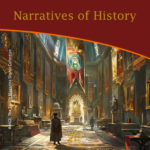 Narratives of History |
 A Very Royal Sesquicentenary |
 Unveiling the Enigma: Discover the Royal Society's Legacy and its Impact on Science. Delve into the fascinating history of the Royal Society, the prestigious UK academy shaping scientific progress since 1660. Explore its pivotal role in advancing knowledge, fostering collaboration, and unlocking the secrets of the universe. Prepare to be amazed! |
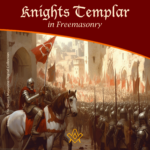 Knights Templar in Freemasonry Uncover the Mysteries of the Knights Templar in Freemasonry! Delve into the intriguing world where chivalry and symbolism intertwine. Discover the captivating rituals and ancient secrets behind the Knights Templar Masonic Orders. Explore the historical connection and delve into the enigmatic narratives that continue to fascinate enthusiasts today. Unveil the hidden truths now! |
 The Royal Arch stands as the rainbow of promise in the Ritual; it stands as the promise of the resurrection; of that which was lost and that it shall be recovered. The question arises as to whether the Master's Word was originally communicated in the Third Degree? On this point there is some diversity of opinion. Originally published in 1915, this insight into the Fourth Degree – the Holy Royal Arch – is as relevant today as it was over 100 years ago. |
 Unveiling the Mysteries of Druidism: Discover the Intriguing Connection with Freemasonry. Explore the ancient spiritual practice of Druidism and its fascinating ties to the enigmatic world of Freemasonry. Delve into the shared symbolism and rituals that have captivated minds for centuries. Unlock the secrets of these intertwined traditions today! |
 Uncover the legacy of freestone masons and their pivotal role in crafting medieval cathedrals. Discover the artistry behind their techniques, the hierarchy within their craft, and the enduring impact of their intricate carvings. A deep dive into the world of these master craftsmen awaits you! |
 Unearth the intriguing journey from Vincha Culture to Freemasonry. Discover how ancient building methods intertwine with modern Masonic philosophies. This exploration will shed light on the fascinating link between the Serbian term "shestarenye" and the symbolic significance of the compass in Freemasonry. |
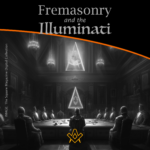 Freemasonry and the Illuminati Unravel the enigmatic world of Freemasonry and the Illuminati in our latest exposé. Dive into centuries-old mysteries, debunk conspiracy theories, and discover the truth behind these elusive societies. Are they puppet masters or mere myths? Join us as we dissect history and fact from fiction. |
 The Île des Templiers, or “Island of the Templars” lies within a leafy park in Paris. The execution site of Jacques du Molay, the last Grand Master of the Knights’ Templar bears a plaque with the epitaph ‘A cet endroit / Jacques de Molay / Dernier grand maître / de l'ordre du temple / a été brûlé le 18 Mars 1314’ (‘In this location / Jacques de Molay / Last grand master / of the order of the temple / was burned on 18 March 1314’) |
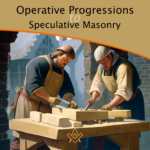 Operative Progressions to Speculative Masonry Both Operative and Speculative Masonry are an important part of the modern fraternity of Freemasonry, which combines elements of both traditions. Today, Freemasonry is a fraternity that is open to men of good character, who are interested in personal development and in making a positive contribution to their communities. |
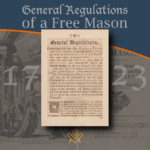 General Regulations of a Free Mason, 1723 General Regulations of a Free Mason as contained in Anderson's Constitutions of the Freemasons, published 1723. the Regulations are of great historical interest. Compiled by George Payne, the second Grand Master of the Premier Grand Lodge of England, they were printed in 1722/3, thus published just over five years after the formation of the Grand Lodge 1717. |
 The Genesis of the 1723 Book of Constitutions 2023, marks the three hundredth anniversary of the publication of the first printed Book of Constitutions of the Grand Lodge formally established in London two years previously. This is an anniversary whose significance extends beyond freemasonry. A paper by Andrew Prescott |
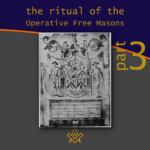 The Ritual of the Operative Free Masons - P3 Existing Operative Free Masons. The ritual I am about to refer, is that of "The Worshipful Society of Free Masons, Rough Masons, Wallers, Slaters, Paviors, Plaisterers, and Bricklayers." By Thomas Carr, M.D., P. M. Honorary Member of the Guild of Operative Free Masons |
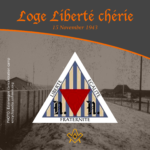 Liberté chérie was a Masonic Lodge founded in 1943 by Belgian Resistance fighters and other political prisoners at Esterwegen concentration camp. It was one of the few lodges of Freemasons founded within a Nazi concentration camp during the Second World War. |
 The Ritual of the Operative Free Masons - P2 If anyone doubts the fact that the formation of Speculative Free Masonry was due to and based upon Operative Free Masonry, it is quite easy to convince him of his error if he will only study the first Book of Constitutions. By Thomas Carr, M.D., P. M. Honorary Member of the Guild of Operative Free Masons |
 In 1881, Freemasonry rose from the ashes of a fire in the mining town of Kokomo, Summit County, Colorado. Corinthian Lodge No. 42, along with Kokomo, no longer exists but it holds the record of having been – at an elevation of 10,618 feet – the highest Masonic Lodge in the USA. |
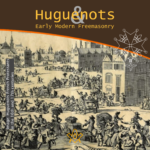 The Huguenots and Early Modern Freemasonry The Huguenots influence in the development of early modern Freemasonry at the time of the formation of the Grand Lodge in London around 1717 / 1723. |
 November is a month of reflection – perhaps due to the fact that we are getting close to the years' end – but also because Remembrance / Armistice Day (11 November) is a significant date in most countries' diaries. |
 Speculative Freemasonry, as practise by Grand Lodge of England, was officially born just over three hundred years ago, is today an international organisation, counting over six million members. It has been subjected to persecution, suppression, and abolition throughout its history. In its infancy, only a couple of decades after its official birth, it had already become a target. |
 The Ritual of the Operative Free Masons - P1 The original paper was written, first, to prove that Speculative Free Masonry was derived from Operative Free Masonry; second, to give some account of the Operative Free Masons, of their Ritual, and of their customs. By Thomas Carr, M.D., P. M. Honorary Member of the Guild of Operative Free Masons |
 American Fraternalism in the 19th and Early 20th Centuries The late 19th and early 20th centuries in the United States has been called the "Golden Age of Fraternalism." How did this come about and why was the idea of joining a fraternal organization so popular? We will explore this question and examine the regalia used by many fraternal organizations in this period. |
 Societas Draconistarum, meaning "Society of the Dragonists"– was a chivalric Order for selected nobility, founded in 1408 by Sigismund von Luxembourg, who through marriage became the King of Hungary (1387–1437) and later Holy Roman Emperor. The Order was fashioned after the military orders of the Crusades, requiring its initiates to defend the cross and fight the enemies of Christianity, in particular the Ottoman Empire. |
 The Perjured Free Mason Detected Was Samuel Prichard a perjured individual, or simply a misguided Freemason? Prichard's book "Free Masonry Dissected" published in 1730, is now used by many Masonic historians as a source of reference with regards to the introduction of the third degree into the Craft. But at the time it was published in 1730, it was not so well received by members of the Grand Lodge of England. |
 17th century and the Holy Royal Arch This article focuses on a period of transition between a point in time when we can safely and historically identify the first formation of what could be called as the ‘Royal Arch’ and the historical events that have preceded it. |
 Most Freemasons have heard the terms 'Operative' and 'Speculative' Masons, and this article helps to understand the difference: |
 Roberts' Constitutions of Freemasonry 1722 Published a year before Anderson's Constitutions, The Old Constitutions Belonging to the Ancient and Honourable SOCIETY OF Free and Accepted MASONS. Originally printed in London England; Sold by J. Roberts, in Warwick-Lane, MDCCXXII.(1722) |
 From 'Songs of religion and life', 1876 by John Stuart Blackie (1809-1895) |
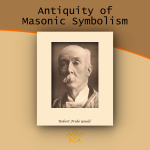 On the Antiquity of Masonic Symbolism Is the Symbolism of Masonry an inheritance derived from the old Masons who flourished before the era of the Grand Lodges (1717); or has it been borrowed from the Rosicrucians or others, after 1717? |
 Mason's Marks – from Egypt to Europe? Mason's marks have been a source of intrigue, not only to Freemasons but to historians and archaeologists. The use of simple pictograms have been employed for millennia by artisans to identify their work. But where did they originate and why? |
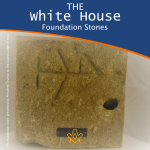 The White House Foundation Stones Further to the articles in our series on the history of the stone masons, we have a rather intriguing addition. During the 1950's renovation of the White House, President Truman retrieved more than 100 stone blocks with stonemasons marks. |
 What the Goose and Gridiron Tavern is in the ancient annals of London Freemasonry, The Green Dragon Tavern is to the memories of the Free-mason, of Boston and New England. |
 Auschwitz concentration camp: video photo article taken in 2013 |
 There are two things of importance happening this day - 27 January |
 Two approaches regarding the understanding of Freemasonry |
 Masonic Research in England c1930 An article which appeared in an American Masonic magazine, c1930 and which was reproduced in England, provoking a little controversy. |
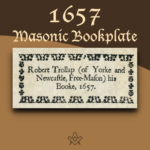 Masonic bookplates the ‘Brethren’s spiritual coats of arms and marks’ |
 The Unlawful Societies Act of 1799 Rebellious Freemasons and the 21st century |
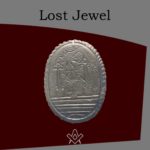 In 1912, Sarah Dowd of Dromore, Ireland, found a Masonic jewel dated 1517 - a date two hundred years before the establishment of Grand Lodge... |
 Freemasonry and Fascist Regime Interesting speech by the famous historian Prof. Aldo A. Mola, who links the fascist regime with the Masonic Associations. |
 Was famous Russian poet Alexander Pushkin a Freemason? And if so, was he a member of the lodge ‘for which all the lodges in Russia were destroyed’? |
 The Importance of Masonic Research Why is accurate - or authentic - Masonic research so important? The importance of making a daily advancement in Masonic knowledge is something that The Square is passionate about promoting. |
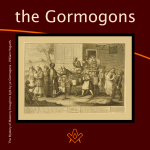 The Antient Noble Order of the Gormogons had a brief existence in the eighteenth century; they left few records or accomplishments, |
masonic knowledge
to be a better citizen of the world
share the square with two brothers

click image to open email app on mobile device







